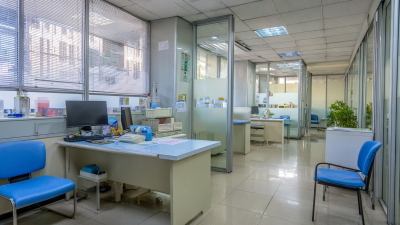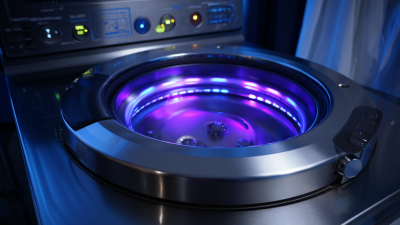Ultimate Guide to Sourcing Roche IVD Products for Global Buyers
Table of Contents
- Understanding Roche IVD Product Range: A Comprehensive Overview
- Key Considerations for Global Buyers of Roche IVD Products
- Steps to Identify Reliable Suppliers of Roche IVD Products
- Navigating Regulatory Requirements for Roche IVD Importation
- Best Practices for Negotiating Contracts with Roche IVD Suppliers
- Strategies for Maintaining Quality Assurance and Support in Sourcing
- FAQS
- Conclusion
- Related Posts
In today’s fast-changing world of in vitro diagnostics (or IVD for short), finding reliable Roche IVD products has become more and more important for buyers around the globe. If you’ve been keeping an eye on the market, you probably already know that, according to a recent report from Grand View Research, the worldwide IVD market is expected to hit around $87 billion by 2027. And that’s mostly thanks to evolving technology and the growing number of people dealing with chronic illnesses.
 Now, Zhejiang Pushkang Biotechnology, which started up back in 2014, really stands out in this space. They’re all about leveraging their core tech — centrifugal microfluidics — to develop some pretty innovative point-of-care tests (you might hear them called POCT). These are used for things like coagulation, biochemistry, CLIA, and molecular testing. As more people and companies look for Roche IVD solutions, understanding how to source these top-quality diagnostics can make a big difference — helping you streamline procurement and, ultimately, improve patient care.
This guide’s got all the tips and insights you need to get a handle on sourcing Roche IVD products smoothly and effectively.
Now, Zhejiang Pushkang Biotechnology, which started up back in 2014, really stands out in this space. They’re all about leveraging their core tech — centrifugal microfluidics — to develop some pretty innovative point-of-care tests (you might hear them called POCT). These are used for things like coagulation, biochemistry, CLIA, and molecular testing. As more people and companies look for Roche IVD solutions, understanding how to source these top-quality diagnostics can make a big difference — helping you streamline procurement and, ultimately, improve patient care.
This guide’s got all the tips and insights you need to get a handle on sourcing Roche IVD products smoothly and effectively.
Understanding Roche IVD Product Range: A Comprehensive Overview
Let's take a moment to talk about Roche’s IVD product range — it’s pretty impressive. Roche has really established itself as a leader in the in vitro diagnostics world, known for coming up with new, smart solutions that meet all kinds of clinical and lab needs. I mean, did you know that the global market for IVDs is expected to hit about $98.4 billion by 2026? That’s a huge number, driven by how much these diagnostic tools are being used for everything from catching diseases early to personalizing treatments. Roche’s lineup includes a wide variety of tech — like immunoassays, molecular diagnostics, and tissue diagnostics — which together make up a big chunk of this rapidly growing market.
In 2022, Roche rolled out a bunch of new products and upgrade to some of their existing ones, especially focusing on PCR and next-generation sequencing. The new tech not only makes their tests more accurate and faster but also helps labs save some cash. A recent report from MarketsandMarkets even suggests that molecular diagnostics are set to grow faster than most other sectors in IVDs. This really highlights just how crucial these tools are becoming, especially for detecting infectious diseases and genetic issues. All in all, Roche’s innovative diagnostics are playing a critical role in tackling health challenges worldwide, and it’s exciting to see how they’re pushing the boundaries of healthcare every day.
Key Considerations for Global Buyers of Roche IVD Products
When you're hunting for Roche IVD products, navigating the global market can feel pretty complicated. You’ve gotta consider a lot—regulatory hurdles, quality checks, and the tricky logistics of the supply chain. It’s really important to get a solid understanding of local healthcare rules because every country has its own standards for in vitro diagnostic devices. Oh, and don’t forget to look for suppliers who meet international quality certifications like ISO 13485—these ensure the products are safe and effective enough to meet strict standards.

At Zhejiang Pushkang Biotechnology Co., Ltd., we’re a high-tech company that started back in 2014, and we’re actually in a pretty good spot when it comes to helping global buyers find innovative IVD solutions. We have deep expertise in centrifugal microfluidics, which means we develop some pretty advanced point-of-care testing products—covering everything from coagulation and biochemistry to CLIA and molecular diagnostics. Working with dependable partners like Pushkang can really help simplify your procurement process and boost the quality of healthcare services. Basically, we aim to be a trusted partner anyone can count on if you’re trying to get Roche IVD products in a competitive and ever-changing market.
Steps to Identify Reliable Suppliers of Roche IVD Products
When you're looking to source Roche IVD products, it’s really important to find reliable suppliers so you can get high-quality diagnostic solutions without any headaches. Start by digging into vendors who specialize in in vitro diagnostics and have a solid track record—they should definitely know their stuff. A good supplier isn’t just about offering a wide range of Roche products; they should also be committed to sticking to the latest regulations. It’s smart to look for those who’ve already successfully handled new rules and have the necessary certifications for class D medical devices—that’s a good sign they’re serious about quality standards.
And don’t forget to check out their logistics. A strong distribution network means your products will arrive on time, which is pretty crucial, right? It’s worth engaging with suppliers who are open about how they source their products and can back that up with documentation showing that what they sell is authentic and top-notch. If you keep these things in mind, you’ll be in a much better spot to build partnerships with suppliers you can trust—especially as healthcare keeps evolving pretty quickly these days.
Ultimate Guide to Sourcing Roche IVD Products for Global Buyers - Steps to Identify Reliable Suppliers of Roche IVD Products
| Supplier Location | Product Type | Certification | Lead Time (Days) | Minimum Order Quantity |
|---|---|---|---|---|
| Germany | Reagents | ISO 13485 | 15 | 100 |
| USA | Assays | FDA Approved | 10 | 50 |
| Switzerland | Testing Devices | CE Marked | 20 | 25 |
| China | Calibrators | CFDA Registered | 30 | 150 |
| India | Quality Control Materials | ISO 9001 | 25 | 200 |
Navigating Regulatory Requirements for Roche IVD Importation
When you're looking to source Roche IVD products, it’s super important to get a good understanding of the regulatory scene—especially if you’re dealing with different countries. Honestly, each country has its own set of rules for importing in-vitro diagnostic (IVD) items, and that can get pretty complicated pretty quickly. So, before diving in, you really need to do your homework on the specific regulations for your target market. Skipping this step could land you in legal trouble, and worse, it might put safety and product effectiveness at risk.
Take the US, for example—it's got its own system, with the FDA classifying IVDs into different risk categories, which then determine if you need to get premarket approval or just notify them. On the flip side, in Europe, they have the CE marking process—lots of strict checks and assessments that your products need to pass before hitting the market. And, trust me, making sure you've got all your paperwork in order—like compliance certificates and import licenses—is critical. Missing something could mean costly delays or, even worse, your shipment getting rejected at customs. So yeah, keep it thorough and double-check everything—it's worth the effort to avoid headaches down the line.
Best Practices for Negotiating Contracts with Roche IVD Suppliers
Negotiating contracts with Roche IVD suppliers isn’t exactly a walk in the park – it really calls for a strategic touch that balances costs, quality, and making sure everything’s on the up and up. I was reading this recent report from Global Diagnostic Market Intelligence, and it mentioned that the IVD side of things is expected to hit around $85 billion by 2026. That’s honestly a pretty big deal, and it just shows how fierce competition among suppliers is getting. If you’re in the buyer’s seat, now’s the time to really make the most of this booming market. Using detailed data analytics can help you figure out the best prices and terms that line up with your organization’s goals – it’s all about being smart and prepared.
When you’re about to enter negotiations, it’s a good idea to set clear benchmarks first. Look at industry standards and what you’ve learned from past procurement deals – it gives you a solid foundation. Frost & Sullivan even found that companies who do their homework with detailed market analysis before talking prices can save up to 25%. Plus, building strong relationships with suppliers isn’t just good for getting better prices; it can also lead to innovation and quicker responses, which is huge in the fast-moving world of diagnostics. So, by keeping these best practices in mind, global buyers can handle those tricky negotiations with confidence and land contracts that really fit their specific needs.

Strategies for Maintaining Quality Assurance and Support in Sourcing
When you're sourcing Roche IVD products, making sure the quality is top-notch is really the key, especially for buyers around the world. One of the first things you wanna do is build solid relationships with trusted suppliers. It’s super important to do your homework—think audits and onsite inspections of the production facilities. Not only does this help make sure they’re following all the regulatory rules, but it also opens the door to more transparency in the supply chain. When you understand how they control quality, it’s easier to trust their products. Working together and keeping the lines of communication open can also make a big difference—if issues pop up, being able to talk about them honestly helps everyone stay on the same page.
Another crucial part of making sure the quality stays high is setting up a good monitoring system after you’ve made the purchase. This means regularly checking how the products are performing and having ways to collect feedback to catch any problems early on. Having clear standards for what quality looks like and using tech tools to track the products during shipping can really boost your overall quality assurance game. And don’t forget—building good relationships with local regulatory agencies can be super helpful for staying compliant with market standards. All of this together really helps ensure that the Roche IVD products you source are reliable, giving you peace of mind as you aim for excellence across your global operations.
Quality Assurance Metrics in Sourcing IVD Products
FAQS
: Global buyers must understand local healthcare regulations, as each country may have distinct standards for in vitro diagnostic devices. Compliance with international quality certifications like ISO 13485 is also crucial.
Buyers should prioritize suppliers with a proven track record of quality assurance, conduct thorough audits and inspections of production facilities, and establish strong relationships with reputable suppliers.
Buyers should leverage comprehensive data analytics for pricing strategies, establish clear benchmarks based on industry standards, and foster strong supplier relationships to facilitate better pricing and innovation.
Conducting due diligence, including audits and inspections, ensures adherence to regulatory standards and fosters transparency, which leads to a better understanding of suppliers' quality control measures.
Implementing a comprehensive monitoring system post-purchase, including regular product performance evaluations and feedback mechanisms, is essential for identifying and addressing discrepancies.
Collaborating with local regulatory bodies helps ensure continuous compliance with market standards, solidifying the reliability of sourced Roche IVD products.
According to Frost & Sullivan, companies that invest in detailed market analysis prior to negotiation can achieve cost savings of up to 25%.
Utilizing technology to track product integrity throughout the shipping process and establishing clear metrics for quality assessment can significantly enhance the overall quality assurance strategy.
A collaborative approach facilitates open communication regarding potential issues, which can improve problem-solving and enhance the overall quality and effectiveness of the sourcing process.
The IVD sector is projected to reach $85 billion by 2026, indicating increasing competition among suppliers.
Conclusion
In our 'Ultimate Guide to Sourcing Roche IVD Products for Global Buyers,' we really get into the nitty-gritty of Roche's diverse range of IVD products. If you're thinking about sourcing these products, it's super helpful to understand some key points—like the complexities involved, how to find trustworthy suppliers, and the ins and outs of navigating all those regulatory hoops. Negotiating contracts is a big deal, and having some solid strategies up your sleeve can really make a difference in getting good terms. Plus, sticking to best practices for quality assurance helps keep the whole sourcing process smooth and reliable.
Here at Zhejiang Pushkang Biotechnology Co., Ltd., we specialize in centrifugal microfluidics and are passionate about creating innovative point-of-care testing (POCT) solutions. Our focus on R&D in the IVD space means we’re quite familiar with the challenges of sourcing Roche IVD products, making us a great partner for global buyers. We’re dedicated to not just delivering high-quality products but also providing top-notch support every step of the way throughout the sourcing journey.
Related Posts
-

What is the Significance of Centrifuging Examples in Modern Industry
-

How to Leverage Poct Ua for Rapid Diagnosis in Clinical Settings
-

5 Best Practices for Understanding Centrifuge Diagram Functions
-

How to Identify the Best Diagnostic Center Near Me for Your Healthcare Needs
-

Mastering the Rcf Centrifuge A Step by Step Tutorial for Optimal Performance
-

Comprehensive Guide to Understanding For In Vitro Diagnostic Use Only Regulations and Standards

